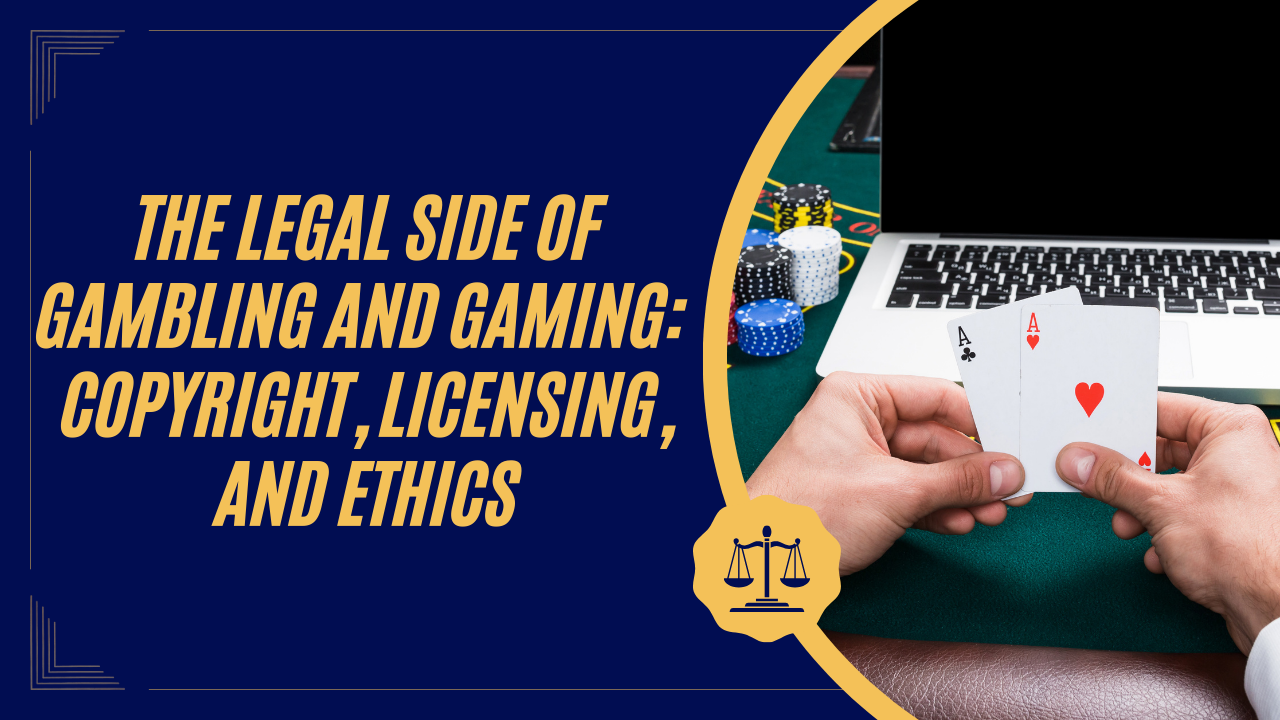The Legal Side of Gambling and Gaming: Copyright, Licensing, and Ethics
The Legal Side of Gambling and Gaming: Copyright, Licensing, and Ethics
The gambling and gaming industries are booming, with millions of players worldwide engaging in everything from online casinos to video games. While these industries provide entertainment and economic benefits, they also bring legal complexities. Copyright, licensing, and ethical considerations play a significant role in shaping the landscape of gambling and gaming. Understanding these legal aspects is crucial for players, developers, and operators alike.
Copyright in Gaming and Gambling
Copyright laws are designed to protect original works of authorship, including software, music, graphics, and other creative elements commonly found in games and gambling platforms. Here’s how copyright impacts these industries:
1. Protecting Game Developers
Game developers invest significant time and resources into creating immersive gaming experiences. Copyright protects their work from being copied or used without permission.
Game Assets: Characters, storylines, music, and visual elements are all protected under copyright laws.
Code Protection: The underlying software code for games is also copyrighted, ensuring that competitors cannot replicate it without consequences.
2. Copyright Infringement in Gambling
The gambling industry often uses copyrighted themes, such as movies, TV shows, and popular characters, in slot machines and other games. Without proper licensing, this can lead to legal disputes.
Example: A casino using unlicensed images or themes from a blockbuster movie could face lawsuits for copyright infringement.
3. Player-Created Content
Many games allow players to create their own content, such as mods or custom skins. While this adds value to the gaming community, it can also lead to copyright issues if the content uses unlicensed assets or violates intellectual property laws.
Licensing in the Gambling and Gaming Industries
Licensing is a critical aspect of both industries, ensuring that creators and intellectual property owners are compensated for the use of their work. Let’s explore how licensing functions in gambling and gaming:
1. Licensing for Gambling Operators
Gambling operators must obtain licenses to operate legally. These licenses vary by jurisdiction and ensure compliance with local laws.
Casino Licenses: Operators of online and physical casinos need licenses to ensure fair play and protect players from fraud.
Software Licensing: Gambling platforms often use third-party software to power their games, requiring proper licensing agreements.
2. Licensing in Video Games
Video game developers frequently license third-party assets to enhance their games.
Music and Sound Effects: Developers often license music tracks and sound effects to avoid copyright issues.
Franchise Licensing: Games based on movies, TV shows, or comics require licensing agreements with the intellectual property owners.
3. Loot Boxes and Microtransactions
Loot boxes and microtransactions, popular in video games, have faced scrutiny over licensing and regulation. Many jurisdictions are considering whether these mechanisms should be classified as gambling, requiring additional licensing and oversight.
Ethical Considerations in Gambling and Gaming
Beyond legal compliance, the gambling and gaming industries face ethical challenges that impact their reputations and relationships with players.
1. Fair Play and Transparency
Both industries must prioritize fairness and transparency to build trust with their audiences.
Random Number Generators (RNGs): In gambling, RNGs are used to ensure fair outcomes. Operators must demonstrate that their RNGs are unbiased and meet regulatory standards.
Game Mechanics: Video game developers must disclose how in-game mechanics, such as loot boxes, work to avoid accusations of unfair practices.
2. Gambling Addiction and Responsible Gaming
The gambling industry has a responsibility to address gambling addiction and promote responsible gaming.
Self-Exclusion Tools: Many platforms offer tools that allow players to limit their spending or take breaks.
Education Campaigns: Operators often run campaigns to educate players about the risks of gambling.
3. Ethical Monetization in Gaming
Video game developers face criticism for predatory monetization practices, such as excessive microtransactions or pay-to-win models.
Balancing Profit and Player Experience: Developers must find ways to monetize games without alienating their player base.
Age-Appropriate Content: Ensuring that monetization practices are appropriate for younger audiences is a growing concern.
Legal Challenges and Case Studies
To better understand the legal complexities in gambling and gaming, let’s examine a few real-world case studies:
1. Epic Games vs. Apple
Epic Games, the creator of Fortnite, filed a lawsuit against Apple over its App Store policies. Epic argued that Apple’s 30% commission on in-app purchases was anti-competitive. This case highlights the legal and ethical challenges of platform monetization.
2. Unlicensed Gambling Apps
Unlicensed gambling apps have faced legal action in several countries. These apps often operate without proper licenses, leading to concerns about fairness, fraud, and consumer protection.
3. Loot Boxes as Gambling
Several countries, including Belgium and the Netherlands, have classified loot boxes in video games as a form of gambling. This has forced developers to adjust their monetization strategies in these regions.
Navigating the Legal Landscape
For players, developers, and operators, understanding the legal landscape is essential for avoiding pitfalls and ensuring a positive experience.
1. For Players
Play only on licensed gambling platforms to ensure fair play and protection.
Be cautious of games with aggressive monetization practices and understand the terms before making purchases.
2. For Developers
Ensure that all assets, music, and themes used in your games are properly licensed.
Stay informed about regulations in different jurisdictions, especially if your game includes gambling-like mechanics.
3. For Operators
Obtain the necessary licenses to operate legally in your target markets.
Implement measures to promote responsible gaming and protect vulnerable players.
Conclusion
The gambling and gaming industries are vibrant and evolving, offering endless opportunities for entertainment and innovation. However, they also come with legal and ethical challenges that must be addressed to ensure sustainability and trust. By understanding the importance of copyright, licensing, and ethics, stakeholders can navigate these challenges effectively and create experiences that are not only enjoyable but also fair and compliant.
As these industries continue to grow, staying informed about legal developments and prioritizing ethical practices will be essential for long-term success.

